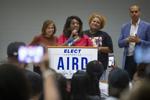There’s no denying the political gold that was and is “Parents Matter.”
The campaign slogan that propelled Glenn Youngkin to the Executive Mansion in 2021 crystallized the frustrations of suburban voters during an unprecedented public health crisis. Eighteen months into the COVID-19 pandemic, schools were struggling to return to in-person learning amid political angst over face masks and science, and there was growing backlash among conservatives over accommodations for transgender students and the alleged teaching of “critical race theory” post-George Floyd.
Black Lives Matter begot Blue Lives Matter and, yes, Parents Matter. If one is offended by the mere mention of systemic racism, or the reality that Black Americans are disproportionately targeted, arrested, incarcerated and even murdered by the U.S. criminal justice system, perhaps you wouldn’t want your children learning about such things in school. So Youngkin shifted focus to the “real” victims: cops just trying to do their jobs, and parents who simply want their kids back in schools, mask-free, with teachers who aren’t preaching Marxism and grooming kindergartners for sex trafficking.
People are also reading…

Gov. Glenn Youngkin speaks with attendees after a “Parents Matter” town hall meeting held at Crestview Elementary School in Henrico County on Aug. 8.
The beauty of “Parents Matter,” however, is in its umbrella-like utility. Not buying that “divisive concepts,” such as critical race theory, which isn’t actually taught in public schools, should be pulled from make-believe curricula? Or that transgender students are lurking in bathrooms ready to pounce on your unsuspecting, gender-conforming child? Perhaps you don’t see how wearing a face mask silences free speech and conveys membership in a socialist cabal?
No matter. Try it on sexually explicit books, or those teaching children the horrors of inclusion and unfiltered American history, or gender-switching athletes stealing lacrosse scholarships from pigtailed, cisgender girls. It works on social media, the bane of our existence: Youngkin’s recent series of “Parents Matter” town halls focused on bills to restrict access to social media sites such as TikTok and Snapchat (never mind the irony of anti-nanny-state parents arguing for nanny-state solutions).
Sloganeering works, particularly when you’re behind in the polls, and especially when your opponent gift wraps and hands it to you in a bluish state that just went to Joe Biden by 10 percentage points. This is what happened in September 2021, when former Gov. Terry McAuliffe, Youngkin’s Democratic challenger, responded to a debate question about what should be taught in schools: “I’m not going to let parents come into schools and actually take books out and make their own decision. … I don’t think parents should be telling schools what they should teach.”
With a month to go in the campaign, the focus on education had begun to peter out. McAuliffe’s gaffe helped Youngkin, who had locked up the MAGA base and social conservatives, energize his suburban appeal. The baby-faced political newcomer would go on to a meager 2-point victory over McAuliffe, but in “Parents Matter,” Youngkin found his identity. The fleece-vested, prep-school basketball standout-turned-private equity millionaire who founded his own church scored as the rich-dad-who-knows-best, becoming a rising star in the national GOP.
Singular campaign slogans, however, rarely translate to good public policy. Just ask former Gov. Jim Gilmore, whose “no car tax” campaign nearly bankrupted the state, or George Allen’s “no parole,” which led to a wave of prison construction and law-and-order Republican politics in the 1990s that still reverberates. Last year, after Youngkin replaced all of his predecessor’s appointments on the Virginia Parole Board, the state granted just 3% of parole applications; Texas, no slouch in the law-and-order department, grants 30%.
Allowing a small subset of parents to dictate what is or isn’t taught in classrooms, or what books are allowed in school libraries, is a great way to start a political firestorm, but it leads to inherently bad public policy. K-12 education cannot reasonably exist as a constitutional right by handing over decision-making to a vocal minority.
For good reason, public education is not a capitalist enterprise. Subjecting the vital role of public schools to the whims of market forces — be it private schoolers or pitchforked parents demanding fealty to the Bible — diminishes access for those families without resources or political clout. Charter or lab schools are great for some, but will academically challenged students from the poorest districts be able to get in? Want to use “education savings accounts” to send your children to a higher-performing private school? That’s fine if your family has the resources, or transportation, to get them there. But it’s not a solution that will help those who need it the most. School choice only works if you have the ability to choose.
Attempting to ascribe specific intent, or motivation, to Youngkin’s one-size-fits-all political proverb is too easily deflected, and misses the point. Wherever one falls on the spectrum — white Christian nationalist, tea partier, liberal progressive or AOC Marxist — almost no one is arguing that our schools, still reeling from learning loss, post-pandemic stress and underfunding, should remain hitched to the status quo.
It’s just difficult, if not impossible, to see how altering history standards, removing sexually explicit books and focusing on who gets to use what bathrooms are going to help any student or school improve academically. If you feel empowered thanks to a sudden rush of “parental rights,” good for you. But don’t think for a second that “Parents Matter” will lead to sound public policy or improved K-12 schools. It hasn’t. And it won’t.
A look at June’s Election Day in photos across Richmond region

Sen. Joe Morrissey speaks to the media after he conceded the election to Lashrecse Aird at an election night party at Brother’s Pizza in Petersburg on Tuesday.

Sen. Joe Morrissey speaks to the media after he conceded the election to Lashrecse Aird during an election night party at Brother’s Pizza in Petersburg. The candidates’ positions on abortion have played a central role in the election.

Sen. Joe Morrissey shakes a supporter’s hand during at election night party at Brother’s Pizza in Petersburg on Tuesday. The incumbent Democrat was defeated by former state legislator Lashrecse Aird in one of the state’s most closely watched contests during the primary.

A voter fills out their ballot at a Republican primary polling location inside the Chesapeake Central Library at 4 p.m., local time, Tuesday, June 20, 2023, in Chesapeake, Va. (Tess Crowley/The Virginian-Pilot via AP)

Signage lines the outside of a Republican primary polling location at Chesapeake Central Library at 4 p.m., local time, Tuesday, June 20, 2023, in Chesapeake, Va. Volunteer Buzz Hartmann, left, waits for potential voters to talk to about Virginia’s Senate Republican Primary race. (Tess Crowley/The Virginian-Pilot via AP)

A voter fills out their ballot at a Republican primary polling location inside the Chesapeake Central Library at 4 p.m., Tuesday, June 20, 2023, in Chesapeake, Va. (Tess Crowley/The Virginian-Pilot via AP)

Signage lines the outside of a Republican primary polling location at Chesapeake Central Library at 4 p.m., local time, Tuesday, June 20, 2023, in Chesapeake, Va. (Tess Crowley/The Virginian-Pilot via AP)

A sign stands at a Republican primary polling location at Chesapeake Central Library on Tuesday, June 20, 2023, in Chesapeake, Va. (Tess Crowley/The Virginian-Pilot via AP)

Volunteer Buzz Hartmann waits for potential voters to talk to about Virginia’s Senate Republican Primary race outside a Republican primary polling location at Chesapeake Central Library on Tuesday, June 20, 2023, in Chesapeake, Va. (Tess Crowley/The Virginian-Pilot via AP)

Voting machines stand at a Republican primary polling location at Chesapeake Central Library on Tuesday, June 20, 2023, in Chesapeake, Va. (Tess Crowley/The Virginian-Pilot via AP)

A sign stands outside a Republican primary polling location at Chesapeake Central Library on Tuesday, June 20, 2023, in Chesapeake, Va. (Tess Crowley/The Virginian-Pilot via AP)

Virginia State Sen. Joe Morrissey, left, greets a voter as he visits a polling precinct Tuesday, June 20, 2023, in Henrico, Va. Morrissey is facing former Delegate Lashrecse Aird in a Democratic primary for a newly redrawn Senate district. (AP Photo/Steve Helber)

Virginia State Sen. Joe Morrissey, top center, talks with Leon Warlington Jr., left, as he visits a polling precinct Tuesday, June 20, 2023, in Henrico, Va. Morrissey is facing former Delegate Lashrecse Aird in a Democratic primary for a newly redrawn Senate district. (AP Photo/Steve Helber)

Virginia State Sen. Joe Morrissey, left, greets a voter as he visits a polling precinct Tuesday, June 20, 2023, in Henrico, Va. Morrissey is facing former Delegate Lashrecse Aird in a Democratic primary for a newly redrawn Senate district. (AP Photo/Steve Helber)

Virginia State Sen. Joe Morrissey, left, talks with Leon Warlington Jr., right, as he visits a polling precinct Tuesday, June 20, 2023, in Henrico, Va. Morrissey is facing former Delegate Lashrecse Aird in a Democratic primary for a newly redrawn Senate district. (AP Photo/Steve Helber)

Virginia State Sen. Joe Morrissey waits to greet voters as he visits a polling precinct Tuesday, June 20, 2023, in Henrico, Va. Morrissey is facing former Delegate Lashrecse Aird in a Democratic primary for a newly redrawn Senate district. (AP Photo/Steve Helber)

A voter walks past election signs at a polling precinct Tuesday, Jun. 20, 2023, in Surry, Va. Lashrecse Aird is running against Virginia State Sen. Joe Morrissey in a Democratic primary for a newly redrawn Senate district. (AP Photo/Steve Helber)

Virginia State Sen. Joe Morrissey, left, greets a voter as he visits a polling precinct Tuesday in Henrico. Morrissey lost to former Delegate Lashrecse Aird in a Democratic primary for a newly redrawn Senate district.

Former Virginia State Delegate Lashrecse Aird, right, talks with poll workers as she visits a polling precinct Tuesday, June 20, 2023, in Surry, Va. Aird is running against Virginia State Sen. Joe Morrissey in a Democratic primary for a newly redrawn Senate district. (AP Photo/Steve Helber)

A voter walks past election signs at a polling precinct Tuesday, Jun. 20, 2023, in Surry, Va. Lashrecse Aird is running against Virginia State Sen. Joe Morrissey in a Democratic primary for a newly redrawn Senate district. (AP Photo/Steve Helber)

Former Virginia State Delegate Lashrecse Aird, right, talks with Surry County Democratic chair Earrett Parson as she visits a polling precinct Tuesday in Surry. Aird defeated Virginia State Sen. Joe Morrissey in a Democratic primary for a newly redrawn Senate district.

Former Virginia State Delegate Lashrecse Aird, right, talks with a voter as she visits a polling precinct Tuesday, June 20, 2023, in Surry, Va. Aird is running against Virginia State Sen. Joe Morrissey in a Democratic primary for a newly redrawn Senate district. (AP Photo/Steve Helber)

Former Virginia state Del. Lashrecse Aird, right, talks with Surry County Democratic chair Earrett Parson as she visits a polling precinct in Surry on Tuesday. Aird beat Sen. Joe Morrissey in a Democratic primary for a newly redrawn Senate district.

James Cherry clicks his pen before filling out a ballot at the Green Spring Gardens polling station in Lincolnia, Va., on Tuesday, June 20, 2023. “I think it’s important to get out and vote in not only your larger, general elections but your primary elections as well,” Cherry said. The polls were seeing low turnout early in the day. (Photo by Minh Connors/The Washington Post via AP)

Glen Sturtevant, who won the Republican nomination in the 12th Senate District, votes on Tuesday at Robious Elementary School in Midlothian.

Robert Wu, left, and Mary Wu vote in the primary election on Tuesday at Robious Elementary School in Midlothian.

Karl Chang, left, shakes hands with Glen Sturtevant before going into Robious Elementary School to vote on Tuesday in Midlothian.

Ashley Hood gets instructions from poll worker Vic Mudryk on Tuesday at Robious Elementary School in Midlothian.

Lori Cochrane Sturtevant, left, and Glen Sturtevant, center, talk to poll worker Pam Maxey after casting ballots on Tuesday at Robious Elementary School in Midlothian.

Virginia State Sen. Amanda Chase talks to volunteer JD Jones outside Bailey Bridge Middle School on Tuesday in Midlothian.

From left, JD Jones, Pat Eggleston, Heather Pyles and Virginia State Sen. Amanda Chase wait to greet voters on Tuesday outside Bailey Bridge Middle School in Midlothian.

Virginia State Sen. Amanda Chase is seeking the Republican nomination in the 12th Senate District. MARGO WAGNER/TIMES-DISPATCH

Virginia State Sen. Amanda Chase talks to voter Jason Sitterson on June 20, 2023, outside Bailey Bridge Middle School in Midlothian, Va. MARGO WAGNER/TIMES-DISPATCH
Former Del. Lashrecse Aird, who defeated Sen. Joe Morrissey, D-Petersburg on Tuesday, gives her victory speech at the IBEW Local 666 in Highland Springs.
State Senator Ghazala Hashmi, left, congratulates Lashrecse Aird after Aird’s victory speech during an election night party at the IBEW Local 666 in Highland Springs, Va. June 20 2023.
Lashrecse Aird wipes tears away after defeating Joe Morrissey at an election night party at the IBEW Local 666 in Highland Springs, Va. June 20, 2023.
Lashrecse Aird prepares to high five a supporter during an election night watch party at the IBEW Local 666 in Highland Springs, Va. June 20, 2023.
Lashrecse Aird hugs a supporter during a watch party at the IBEW Local 666 in Highland Springs on Tuesday. Aird defeated incumbent Democrat Sen. Joe Morrissey.







